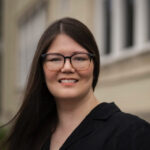ASWB’s Practice Analysis Task Force: Purpose and passion at work

When I joined the Association of Social Work Boards Practice Analysis Task Force, I knew I’d connect with other members over our shared passion for social work and for advocating on behalf of those we serve. I’ve been involved in several regulatory task forces throughout my career, including with the Minnesota Board of Social Work, and I expected this experience to be similar. But my experience on this task force surprised me — and has even exceeded my high expectations.
Views from the field
This commentary is part of a series that shares the perspectives of social work thought leaders, focusing on licensing, regulation, and the exams.
As I entered the conference room at our weekend-long task force meeting this September, I scanned the room and felt excited and inspired. The group was even larger and more diverse than I expected. There were more than 30 of us, many more than served on previous Practice Analysis Task Forces. As we got to know each other, we realized that we represent a wide range of communities across the United States and Canada. We bring a variety of backgrounds and perspectives, both personally and professionally. A couple of members are regulators, like me, but we are all practicing social workers serving communities and clients.
We make up a large, diverse group, but we are all passionate about our common purpose. We’ve come together to serve as subject matter experts for ASWB’s upcoming practice analysis, which has been reenvisioned as the Social Work Census. The census will gather information about social workers, including practice areas and demographic information, to develop a clearer picture of the workforce. The census will further ASWB’s mission to amplify diverse voices by being more inclusive than ever, inviting participation from everyone who calls themselves a social worker. It will also collect practice information to inform the next iteration of the social work licensure exams, ensuring that they reflect a profession that is always adapting to new challenges.
We appreciate that we are playing an important role at a crucial time for our profession. In today’s complex world, determining what knowledge and skills are necessary to be a licensed social worker is no easy task. We understand that ensuring fairness and equity in our licensure process is vital to the integrity of our profession.
I was struck by how much thoughtfulness and intentionality each task force member brings to this work. At our September meeting, we broke into small groups, each focusing on one of the four social work licensure exams: Bachelors, Masters, Clinical, and Advanced Generalist. I was in the group reviewing the Advanced Generalist exam, which I took in order to do macro-level and policy work.
In our group, we discussed ways in which the exam could more fully capture the necessary competencies and knowledge areas for this category. For example, we added new knowledge statements to reflect the increase in the use of technology for the practice of social work since the last exam. Every person in the group contributed meaningfully — and I heard similar reports from other groups.
During this process, ASWB’s outside research consultants worked with the task force to ensure that the process was scientific, systematic, and rigorous. As we reviewed each knowledge statement and came to a consensus about changes, the facilitators noted our decisions and actively worked to include the voice of every task force member. It was a formal process that ensured that every one of the hundreds of knowledge and task statements was considered fully by each subject matter expert.
The reality is nothing like the image some may still have of a small, homogeneous group making decisions based solely on their own experience. Speaking for myself, my identity is multifaceted and includes being Native American, bisexual, and a woman in my 30s. I work for the Minnesota Women’s Sexual Assault Coalition, running our National Tribal Sexual Assault Resource Center. My fellow task force members vary widely in age, ethnicity, sexual orientation, and religion — and they hold a variety of roles within social work. We’re a far (and wonderful) cry from the small, rarified group some might envision.
While I’ve been inspired by the people and purpose of the task force, we clearly have our work cut out for us. The Practice Analysis Task Force is only part of ASWB’s broader effort to ensure that the exams — and the whole licensure process — are as fair, inclusive, and accessible as possible. When it comes to licensure, ASWB has always solicited and incorporated input from across the profession. I’m prouder than ever to be part of ongoing efforts to make social work practice even safer, more professional, and more inclusive.
Jolene Engelking, MSW, B.A., MDiv, LISW (White Earth Descendant), is an advocate and skilled trainer/facilitator who serves as chair of ASWB’s Practice Analysis Task Force. She serves on the Minnesota Board of Social Work and works for the Minnesota Indian Women’s Sexual Assault Coalition. Jolene’s current focus is on launching and leading MIWSAC’s new National Tribal Sexual Assault Resource Center, while supporting the coalition’s other national training and technical assistance projects. Jolene received her dual masters in divinity and social work from Loyola University Chicago and is a Licensed Independent Social Worker in Minnesota. She has been in the anti-sexual violence movement for more than 15 years, in both community-based advocacy and national training and technical assistance.

